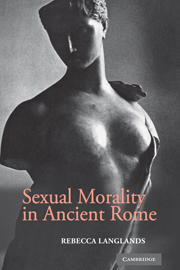Book contents
- Frontmatter
- Contents
- Acknowledgements
- Introduction
- Chapter 1 Sexual virtue on display I: the cults of pudicitia and honours for women
- Chapter 2 Traditional narratives and Livy's Roman history
- Chapter 3 Valerius Maximus: the complexities of past as paradigm
- Chapter 4 Subversive genres: testing the limits of pudicitia
- Chapter 5 Declamation: what part of ‘no’ do you understand?
- Chapter 6 Sexual virtue on display II: oratory and the speeches of Cicero
- Chapter 7 Imperial narratives, imperial interventions
- Conclusion
- Bibliography
- Subject index
- Index locorum
Conclusion
Published online by Cambridge University Press: 22 September 2009
- Frontmatter
- Contents
- Acknowledgements
- Introduction
- Chapter 1 Sexual virtue on display I: the cults of pudicitia and honours for women
- Chapter 2 Traditional narratives and Livy's Roman history
- Chapter 3 Valerius Maximus: the complexities of past as paradigm
- Chapter 4 Subversive genres: testing the limits of pudicitia
- Chapter 5 Declamation: what part of ‘no’ do you understand?
- Chapter 6 Sexual virtue on display II: oratory and the speeches of Cicero
- Chapter 7 Imperial narratives, imperial interventions
- Conclusion
- Bibliography
- Subject index
- Index locorum
Summary
The philosopher Seneca requests of Lucilius: ‘Teach me what pudicitia is, and how good it is, and whether it is located in the body or in the soul.’ We can now see what a resonant and challenging topic this is for a Roman philosopher, drawing him into long-standing and irresolvable debates about the nature of virtue, the nature of the moral subject and his or her relation to others, the moral responsibility of the individual for his or her own actions and experiences. Pudicitia could be located in the body or in the soul, or in the body and the soul; it could be more or less closely identified with virtue and moral strength or with (outmoded or inappropriate) idealism or (misleading) veneer, or with a physical state over which a disempowered individual had little control. It could be a badge of honour for married women or male politicians, a corporeal or notional purity under siege from bullying libido, a guardian of Roman freedom or an avenging brutality.
Pudicitia delineates a sphere of moral anxiety and reflection rather than appearing in our sources as a coherent and defined quality. Focusing on one text or group of texts at a time has enabled this book to highlight this diversity within, and to show that any attempt to resolve the puzzle of pudicitia with a single, simple definition is misguided. Any solution to the puzzle pudicitia poses is always necessarily contingent or temporary.
- Type
- Chapter
- Information
- Sexual Morality in Ancient Rome , pp. 364 - 365Publisher: Cambridge University PressPrint publication year: 2006



